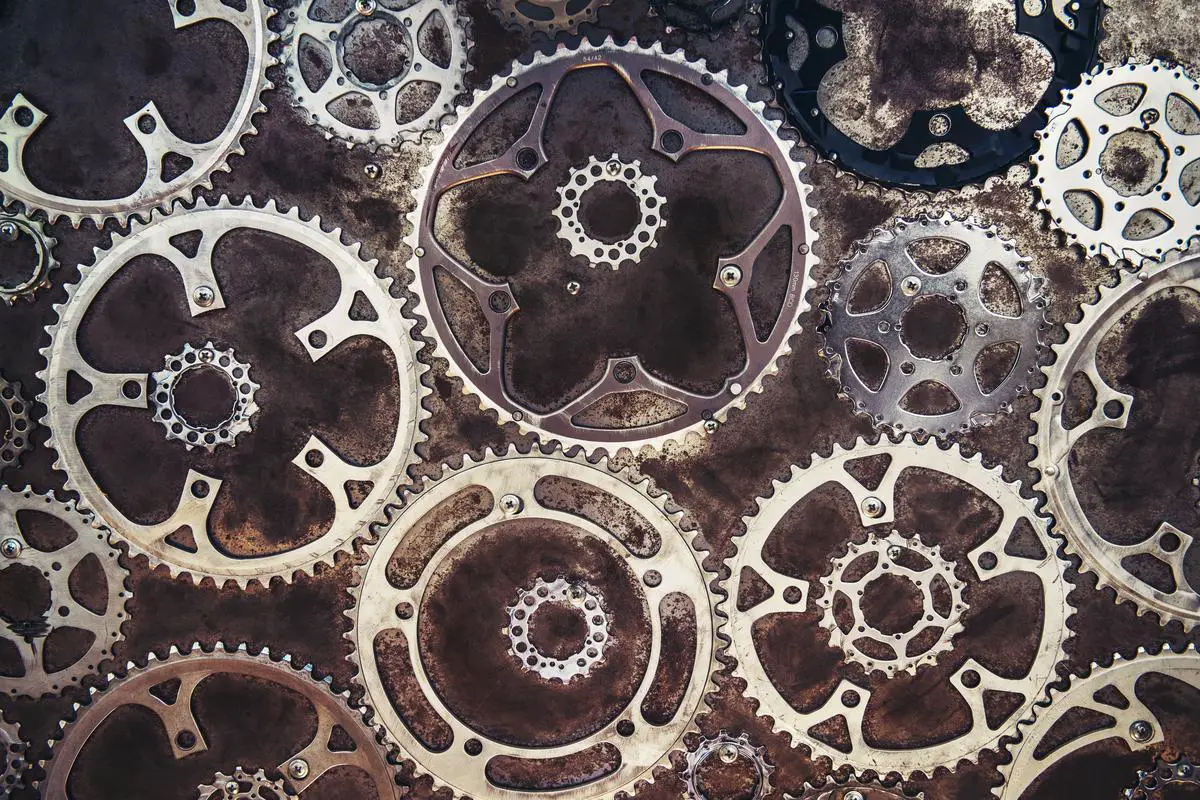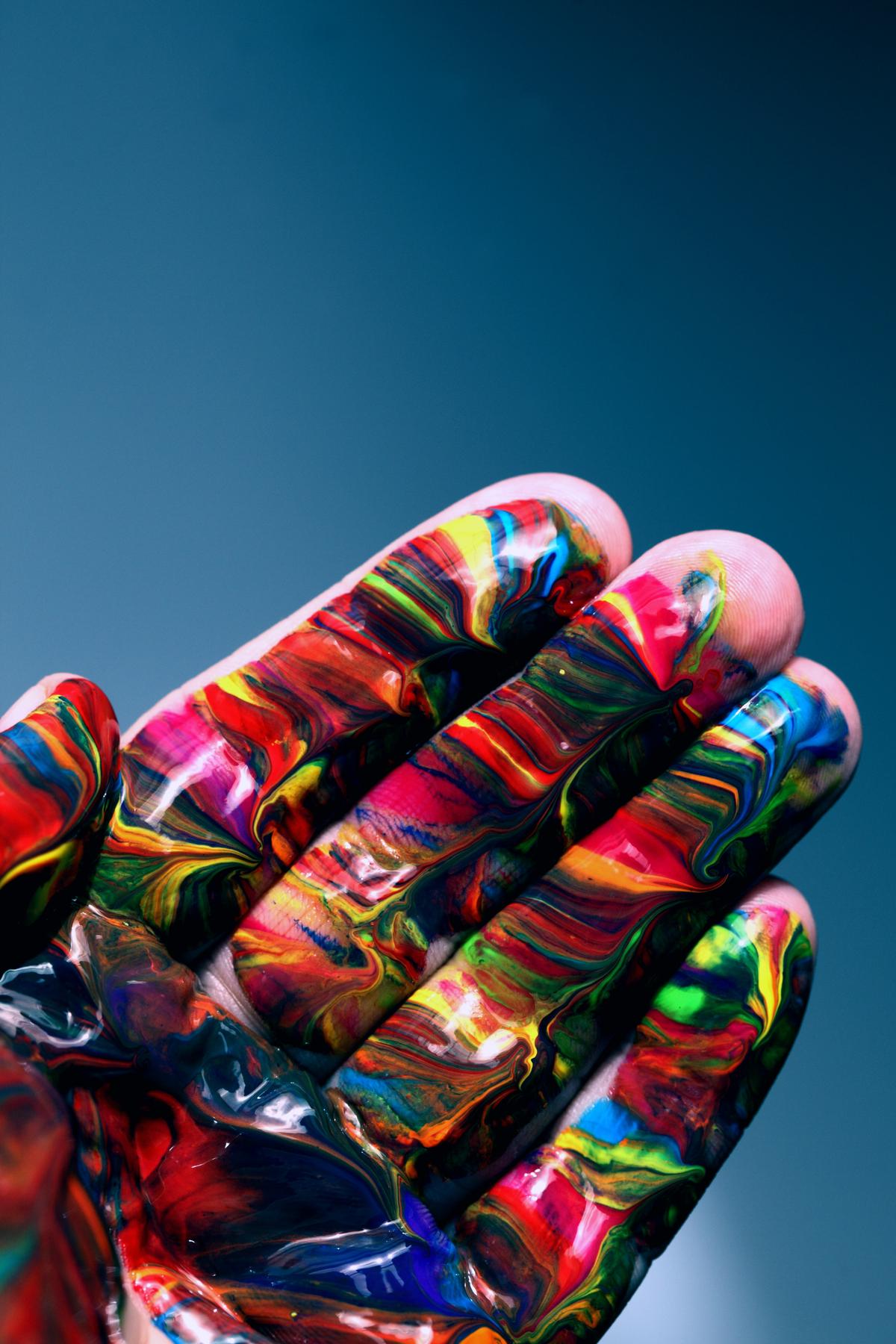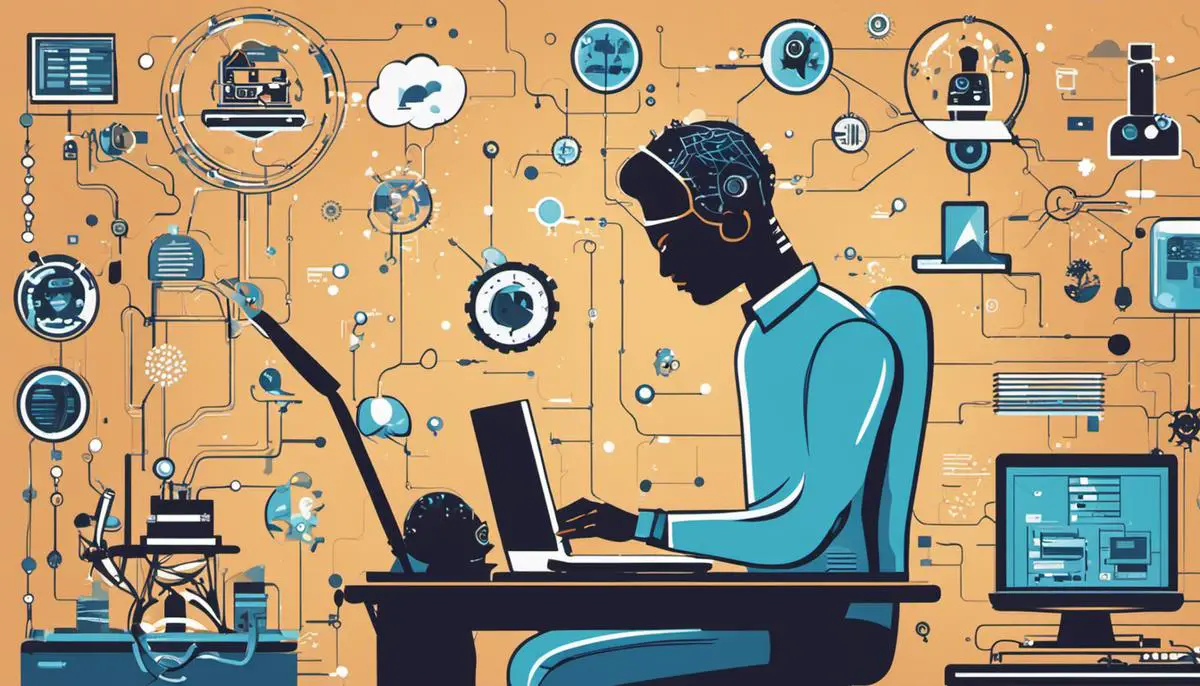As we sail through the digital age, AI, or Artificial Intelligence, is making substantial thrive across a spectrum of sectors, and web content creation is no exception. Driven by mechanisms like Natural Language Processing (NLP), machine learning algorithms, and deep learning, AI represents a powerful tool that propels the massive volume of content populating our digital world today. Unfolding this narrative, this exposition unpacks the role AI performs in web content creation, including its efficiency, quality implications, and the contentious aspect of its creativity. Alongside, it further ventures into the essential ethical discussions affiliated with AI-based content production and envisions what the future could possibly hold in this rapidly evolving sphere.
Understanding AI and its Role in Content Creation
Revolutionizing Web Content Creation: The Influential Role of Artificial Intelligence
Artificial intelligence (AI) has taken center stage in numerous fields, and its revolutionary influence on web content creation is nothing short of remarkable. This emergent technology has exhibited tremendous prowess, raising the bar in content quality, efficiency, and consistency – contributing to the evolution and betterment of the digital realm.
The crux of AI’s contribution to web content creation lies in its inherent ability to analyze massive amounts of data efficiently. As a sophisticated form of machine learning, AI can sift through complex, large-scale datasets with admirable speed and precision. This capability allows it to recognize patterns and ascertain trends far beyond the capability of human cognition. Hence, content tailored by AI has the potential to be better aligned with audience preferences, significantly enhancing user engagement and satisfaction.
Another noteworthy contribution of AI in web content creation is its capacity for natural language processing (NLP). In essence, NLP allows computers to understand, interpret, and manipulate human language, a fundamental aspect of content creation. AI, in conjunction with NLP, facilitates the crafting of human-like text, proficiently simulating the user experience of interacting with a human content creator. This capacity to generate engaging, nuanced content has revolutionized the web content creating field, propelling it toward a future where machine-written content may be virtually indistinguishable from human-written content.
Moreover, AI’s ability to automate content creation tasks significantly reduces manual labor, hence maximizing efficiency. It is capable of generating content in seconds, a feat human writers may struggle to match. While this speed of task execution was once a far-off aspiration, it is now within the realm of the possible, thanks to AI.
AI also excels in its ability to offer highly personalized content based on user behavior. It can predict what type of content a user would be interested in by analyzing their past online activities. This personalized approach to content creation helps organizations connect with their audiences more effectively and build brand loyalty.
Artificial intelligence, owing to its data analysis capabilities, NLP proficiency, automation potential, and personalization prowess, unequivocally enhances web content creation. Its ability to navigate the complex landscape of digital interaction, craft human-like text, drive exponential efficiency, and offer targeted personalization stands as a testimony to AI’s transformative power in web content creation.
As technology continues to evolve, as will the role of AI within content generation. The promise it holds is monumental, capable of sculpting an agile, responsive, and nuanced digital landscape like never before. The capabilities of AI are just beginning to be realized; the full potential of its impact unfathomable. AI technology’s contributions to web content creation herald a dynamic, progressive, and exciting future. From automating mundane tasks to crafting engaging and personalized content, AI plays a monumental role in shaping the way information is curated and presented online.

Photo by timmossholder on Unsplash
Quality and Efficiency of AI-Generated Content
As we traverse the frontier of technological advancements, one of the most fascinating areas of exploration is the content generated by Artificial Intelligence (AI). Its efficiency and quality remain central to many debates, with discussions fueled by the rapid proliferation of AI in our daily lives. There are compelling reasons for this, as AI demonstrates the capacity to revolutionize numerous aspects of web content creation.
Delving into a deeper understanding, one becomes cognizant that AI’s efficiency is derived from its multifaceted functionality. AI has transcended the boundaries of rudimentary tasks to comprehend, interpret, filter, and even effectively communicate complex human emotions; the cornerstone of productive web content. Albeit, these competencies necessitate large depth learning algorithms and extensive training.
Moreover, while the words ‘AI’ and ‘quality’ may initially appear incongruous, AI’s ability to consistently produce high-standard content has been increasingly evidenced – a testament to the technological ingenuity of contemporary society. In fact, AI’s indomitable pace, precision, and capacity for error reduction substantiate its contribution to elevating the quality of web content.
The sophistication of AI-generated content is rooted in concepts such as semantic analysis and sentiment evaluation. This allows AI to discern nuanced human language patterns and respond in a manner that resonates with the audience. From granular attention to linguistic details to wide-ranging thematic consistency, the AI’s dexterity is immensely advantageous for creating coherent, contextually pertinent, and engaging content.
Nonetheless, questions about creativity and originality in AI-generated content persist. Facts are immutable: AI does not possess intrinsic creativity in the human understanding of the term. However, its vast database enables it to formulate new combinations of existing knowledge while its capabilities of sentiment and syntax analysis can simulate human writing styles quite convincingly.
Considering the personalization aspect, AI’s predictive analysis offers potential enhancements beyond the present capabilities. Analyzing user behavior extends beyond identifiable silos of interest, varying by time, mood, environment, and other influences. Consequently, AI’s rollout of personalized content will be an ongoing process of refinement, molded by an evolving understanding of diverse user propensities.
In the panoramic view of web content creation, AI’s aging metamorphosis carries a profound potential. Its transformative impact may not be wholly foreseeable at present but is alluded to through its current dynamism. The role of AI in reshaping the digital landscape will continue to inspire inventions, reshape industries, and redefine user experiences.
Given the labyrinthine world of AI-generated content, one establishes that prospects coexist intertwined with challenges. Whether AI’s efficiency and quality compete or supersede human potential remains a contemplative discussion rather than a conclusive verdict. However, undeniably, the AI revolution is driving a paradigm shift in web content creation, the implications of which are as fascinating as they are impactful.

Photo by erik_lucatero on Unsplash
AI and Creativity in Content Creation
Advances in AI tools indeed have the capacity to generate complex narratives, but these are contingent on predetermined algorithms. Their narrative trajectories are controlled by their developers and guided by evidently predictable patterns, thus confounding the notion that AI can genuinely be creative. This brings us to the argument about the autonomy of AI in creative endeavors. Can AI spontaneously generate an entirely original idea, or does it merely correlate and integrate existing ideas?
We must understand that creativity involves cognitive flexibility, modulated by emotions, personal experiences, and social context. Creativity is not merely the product of logical thoughts, but also thrives on new insights, imagination, and intuition. Artistic creativity, in essence, also involves a deep understanding of human experiences – pain, joy, and various shades of emotions that AI, devoid of human consciousness, cannot empathize with or replicate.
Discussions on this matter must also take into account the concept of serendipity – unforeseen associations that lead to creative breakthroughs, fortuitous mistakes that reveal new directions, or accidental experimentation that introduces novel perspectives. Unlike humans, AI lacks the capacity for such spontaneous creativity.
Conversely, machines can take a giant leap forward with supervised learning, learning from numerous examples and accurately making predictions based on them. Neural networks used in this machine learning technique mimic human brain cells and can learn patterns and make decisions. However, their learning is restricted to the pre-defined model, which eventually limits creative scope.
Considered from another perspective, while AI can generate coherent and structurally sound sentences, does it truly grasp the underlying connotation or subtle nuances? Literature, especially, is embed with layers of depth and multiple interpretations, a labyrinth of paradoxes, and intricate emotional nuances. These are reflections of human complexity and duality which cannot be quantitatively predicted or accounted for by AI models.
While AI can create tremendous volumes of authentic, high-quality content using deep learning, semantic analysis, and sentiment evaluation, it continues to grapple with embodying humanotic artistic creativity. Despite significant progress in AI’s ability to create tailored, personalized content, the true essence of human creativity, with its unpredictability and emotional complexity, remains elusive to AI.
In conclusion, AI’s omnipresence and pivotal role in web content creation is undebatable. It brings path-breaking efficiency and multifaceted functionality to the digital landscape. Still, replacing the artistic creativity inherent to human writers in content creation seems a long stretch in the foreseeable future. AI’s transformative power is substantial, but it can not eclipse human flair, ingenuity, and spontaneity, which are integral components of creativity. Artificial Intelligence indeed reinforces, rather than replaces, human creativity.

Photo by sharonmccutcheon on Unsplash
The Ethical Implications of AI in Content Creation
The Ethical Considerations in Using Artificial Intelligence for Content Creation
Advancements in artificial intelligence tremendously changed the landscape of web content creation and brought forward a host of ethical concerns that should not be dismissed.
The advent of AI introduced the concept of artificial creativity, evoking ethical debates on authenticity, accountability, and transparency of AI-generated content. AI can emulate patterns but understanding the depth of creativity, context, and the inherent humanistic unpredictability of creative endeavors is beyond AI’s current capabilities. This invokes the question, can AI-created content ever be considered truly original? It would be an overreach to credit AI with originality or creativity in the same vein as human artists and writers.
Another significant inquiry pertains to authorship and accountability: who is responsible for AI-generated content? Can AI take the credit, or should it belong to the developer, user, or the data from which the model learned? This raises concerns about copyright infringements and intellectual property rights. It is crucial to define a clear boundary of ownership and responsibility, given the fact that AI, despite being the medium of creation, does not possess consciousness or intentions.
In addition, questions of transparency arise in the use of AI in content creation. Disclosure becomes paramount in a world where AI-generated content mingles almost indistinguishably with human efforts. The rise of AI-produced content may lead to an erosion of trust if not handled responsibly. Mitigation of transparency issues will require necessary steps to signify content that has been crafted by AI, avoiding the potential trap of misleading consumers and misrepresenting the origin of content.
Further, the threats of content manipulation and misuse of AI are substantial. It can be an effective tool for widespread misinformation or deceptive advertising. The potential to alter content in a manner that borders illicit manipulation, or generate high volumes of spurious content, signifies the potential undermining of content integrity. It remains of paramount importance to implement strong checks in order to keep information clear, accurate, and reliable.
The ethical quandary is also felt in the potential reduction of job opportunities for human writers and content creators due to automation. While AI can efficiently perform mundane tasks and produce high volumes of content, it is essential to balance this efficiency against the human cost, ensuring a harmonious coexistence rather than fostering a sense of displacement.
Finally, the emergence of AI in content creation holds implications for privacy rights, due to the host of data required for training these algorithms. Privacy concerns heighten as AI requires an array of personal data to generate tailored content, presenting a potential risk of breach or misuse.
Elucidating a universal ethical framework that oversees the use of AI in web content creation is indispensable. Striking the balance between embracing the benefits of technology and preserving human ethical values will pave the path towards an inclusive, responsible, and transparent digital future shaped by both humans and AI. The rulebook has yet to be written, and it remains our collective responsibility as a society to oversee that these tools are wielded with wisdom and caution.

Future Prospects of AI in Web Content Creation
As we cast our minds into the uncertain future, it becomes abundantly clear that we ought to consider the complexities and implications of Artificial Intelligence (AI) on web content creation. To approach this, it is vital that we grapple with the issues concerning authenticity, responsibility, and accountability of the rapidly evolving AI tools.
AI’s ability to replicate a myriad of writing styles and generate engaging content raises considerable questions about authenticity and originality. Can machine-generated content, though competent and persuasive, truly capture the fleeting authenticity inherent in human creativity? This challenge necessitates the development of mechanisms that can assure the originality of AI-generated content while highlighting the humanistic elements that may remain absent from such creations.
Responsibility and accountability in AI-created content is a conundrum that invites rigorous scrutiny. In a scenario where misleading or harmful content is generated, who is held to task — the creators, operators, or the AI itself? As AI advances, the establishment of a firm and universally accepted code of ethics seems not just desirable, but necessary.
We tread on precarious ground when it comes to copyright infringement and intellectual property rights in the realm of AI content creation. As AI models often learn from vast quantities of data sourced from the Internet, including copyrighted material, the lines of ownership and originality become unfathomably blurred. To preempt potential disputes, comprehensive legislative measures that recognize the unique workings of AI and protect the interests of individuals and entities need to be carefully crafted and implemented.
Transparency emerges as a critical concern as AI forges ahead in content creation. Distinguishing between AI-created content and human-produced work may grow increasingly difficult as AI systems improve. It is therefore paramount to establish clear guidelines to ensure that users are aware of the origins of the content they consume.
With the capabilities AI possesses, there’s an equally compelling dark side that revolves around the risks of content manipulation, and misuse. AI algorithms merely execute what they are programmed to do, and it is this feature that can be exploited by individuals with malintent. Therefore, stringent safeguards need to be in place to prevent such abuses.
Beyond the technological, AI’s impact on job opportunities for human writers and content creators is a justified concern. Can we truly reconcile the productive efficiency of AI with the potential loss of livelihood for content creators? Thus, it becomes urgent to foster a collaboration between the human and AI, highlighting the irreplaceable value of human intuition, ingenuity, and creativity beloved in content creation.
The collection and utilization of personal data to enhance the sophistication of AI also brings forth privacy concerns. The assurance that personal information would remain secure amidst this revolutionary change is of paramount importance in preserving trust within the digital ecosystem.
Summing up, the need for a universal ethical framework for AI in web content creation is indisputable. Our drive to leverage the benefits of AI should be balanced with the resilience of our ethical values to ensure a responsible digital future. In the face of these unprecedented upheavals, it is our collective responsibility to ensure that AI respects and enhances our shared values, ultimately serving to augment rather than extinguish the human spirit. Thus, it’s not about eclipsing human brilliance with artificial intelligence, but rather, it’s about fostering a future where they coexist and flourish together.

Immersed in an epoch of exponential digital progression, the role of AI in revolutionizing web content creation is undoubtedly inspiring extraordinary shifts in the landscape. Considering both its capabilities and complications, it presents a future brimming with astonishing possibilities and significant challenges. Whether it be creative ability or quality, efficiency, or ethical implications, the narrative of AI in content creation is far from over. As we continue to unravel the potential of AI, we also stand on the threshold of a new panorama where human creativity and artificial intelligence may intertwine more seamlessly to reshape the field beyond any existing precedent.
